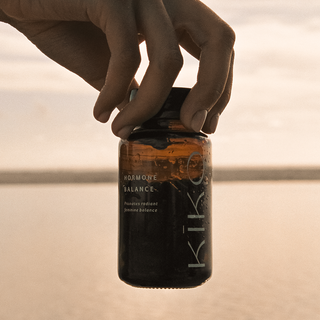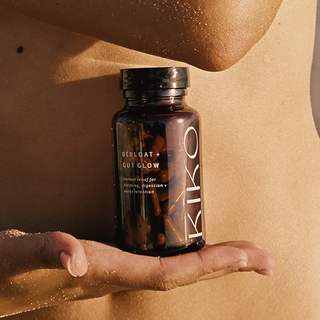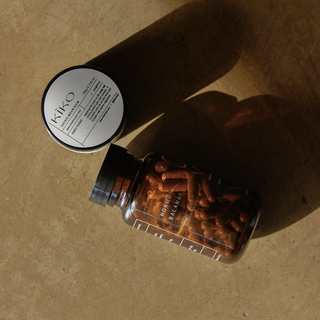Many health headlines these days talk about the gut microbiome, which is a collection of both healthy and bad bacteria found in the digestive tract that has a significant impact on one’s health.
Here’s something you may not be aware of: the gut microbiota has a direct and significant impact on hormones. When estrogen enters the body, a bacterial group called the estrobolome breaks it down and removes it. But wait, there’s more. Additionally, a balanced microbiota helps with hormone balance by reducing inflammation (which may be particularly beneficial in the case of hormonal acne) and supporting balanced blood sugar levels, both of which are critical for repairing hormones. Our bodies can better absorb nutrients for hormone restoration when our guts are healthy.
There is an underlying hormone imbalance if you experience symptoms such as low libido or mood swings that are associated with acne or bloating. You can assist repair your symptoms by paying attention to your gut health. Gut health is intimately related to hormonal wellness.
The Relationship Between Gut Hormones and Other Body Functions (And What Causes Poor Gut Health)
To prevent a condition known as estrogen dominance, in which estrogen levels are too high compared to progesterone, your body’s estrobolome, a collection of gut bacteria dedicated to processing and removing estrogen, helps.
Stress, poor sleep, exposure to pollutants in the environment, and other aspects of contemporary life all contribute to hormonal imbalances, which can lead to estrogen dominance. Slow detoxifying systems exacerbate the problem, which is where the estrobolome comes in. As a result, your body’s ability to detox estrogen will be hindered if it’s in bad shape or the estrobolome bug balance is off. (Other factors, such as liver health, contribute to poor detoxification, but the estrobolome is a key participant.
Poor diet, vitamin deficiency, and toxic overload all contribute to poor gut health and poor detoxification.
To properly restore your hormones, you must support your gut health (and solve your rotten hormone-related symptoms).
Symptoms of an Unhealthy Gut
- Hormone imbalances
- Bloating and gas
- Heartburn
- Acne or other skin issues like rosacea or eczema
- Chronic diarrhea or constipation (or both)
- Brain fog, inability to concentrate
- Headaches
- Frequent illness, from colds to yeast infections
- Depression
- Anxiety
- Feelings of chronic fatigue
- Difficulty losing weight
In other words, obese persons have a less diversified microbiome than leaner ones, and as they lose weight, their gut flora changes as well. Fats and carbohydrates must be broken down and transported out of your body by healthy gut flora, just as excess hormones must be eliminated by good gut flora.
Gut dysbiosis has also been related to mental health issues including depression and anxiety, in part because of the gut-brain axis’ enormous influence on general health.
Ways to Heal Your Gut And Solve Your Hormone Problems
- Say goodbye to white foods. Dairy, sugar, and gluten are all included in this diet. Sugar consumption has been related to alterations in the gut microbiome, according to the latest research. Similarly, studies have linked better gut health to a reduced diet of dairy products. In addition to aggravating the intestinal lining, gluten has been linked to a slew of other health and hormone issues.
- Increase your intake of meals that help regulate your blood sugar. When you have a healthy gut, your blood sugar levels are more stable, and vice versa. It’s a win-win for your hormones, and it’s a positive spiral! Healthy fats like olive oil and salmon should be prioritized above those that are high in glycemic index (GI) but poor in phytonutrients (PCN).
- Consume fermented foods to maintain a healthy digestive system. Fermented foods like kimchi and sauerkraut, which are high in probiotics, can make a big difference in gut health with just a few tablespoons a day.
- Adopt a lifestyle that is low in inflammation. Inflammation in the digestive system is harmful (and bad for overall health). Reduce inflammation by eating low-glycemic meals, avoiding harmful exposures, getting enough sleep and exercise, and following a phase-based self-care strategy.
- Take a reputable probiotic supplement for your digestive health. The stomach acid destroys the majority of probiotics (the powerful acid in the stomach destroys the live cultures before they can reach our intestines and work their magic). Make sure you’re buying from reputable companies, like the one who created the probiotic in my Balance supplement line.
- Limit your exposure to antibiotics. All bacteria, not just the bad ones, are killed off by antibiotics. Use antibiotics sparingly (always consult with a trustworthy healthcare provider before doing so) and steer clear of meat from animals that were given antibiotics during their whole life cycle.
- Reexamine the pill’s efficacy and safety. Hormonal birth control, like antibiotics, upsets the delicate balance of good and bad bacteria in the stomach. Inflammatory bowel disorders such as Crohn’s and ulcerative colitis are linked to the pill, according to research. If you’re currently taking the pill and wish to stop, you can do so without experiencing any side effects by using a systemic approach. It’s always best to check with a trusted healthcare professional before making any changes to your medication.)
- Take Kiko Hormone Balance. KIKO is an ‘all in one’ hormone balancing supplement, made to help women with hormonal imbalances such as Polycystic ovary syndrome (PCOS), Premenstrual syndrome (PMS), Endometriosis, Menopause, Weight Gain, and Acne.




